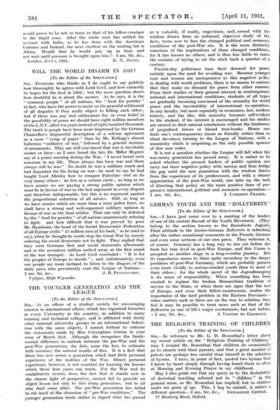THE YOUNGER GENERATION AND THE LEAGUE
[To the Editor of the SPECTATOR.] Sin,—As an officer of a student society for encouraging interest in international affairs, which has organized branches in every University in the country, in addition to many training and technical colleges, and is affiliated with thirty other national university groups to an international federa- tion with the same objects, I cannot forbear to criticize the statements made by Miss Conyngham Greene in your issue of March 21st. Although she recognizes the funda- mental difference in outlook between the pre-War and the post-War generations, she fails, none the less, to estimate with accuracy the natural results of this. It is a fact that there has now arisen a generation which had little personal experience of the realities of the War. Direct personal experience, however, is not essential for learning the lessons which those four years can teach. For the War and its contributory events, from the fact that it stands now in the clearer light of perspective, cannot fail to provide an object lesson not only to this rising generation, but to all who shall come after. The pre-War generation has failed to rid itself of the obsession of " pre-War conditions." The younger generation tends rather to regard what has passed
as a valuable, if costly, experience, and, armed with the wisdom drawn from an unbiased, objective study of the facts, turns now to face the changed political and economic conditions of the post-War era. It is the more distinctly conscious of the implications of these changed conditions, for it has kno*n no others, and is thus less liable to make the mistake of trying to set the clock back a quarter of a century.
Present-day politicians base their demand for peace entirely upon the need for avoiding war. Because younger men and women are unresponsive to this negative policy in dealing with world problems, there is no reason to assume that they make no demand for peace from other reasons. From their studies or their general interest in contemporary national and international conditions, students of all types are gradually becoming convinced of the necessity for world peace and the inevitability of international co-operation. In any faculty, but more especially in economics, law, modern history, and the like, this necessity becomes self-evident to the student, if his interest is encouraged and his studies are carried to their natural conclusions without the hindrance of prejudiced tutors or biased text-books. Hence one finds one's contemporaries (more as friendly critics than as blind devotees) turning to the League of Nations, with a unanimity which is surprising, as the only possible sponsor of this new order.
It is not a question whether the League will fall when the war-weary generation has passed away. It is rather to be asked whether the present leaders of public opinion can carry out their negative policy with success and thus bridge the gap until the new generation with the wisdom drawn from the experience of its predecessors, and with a clearer appreCiation of the post-War world, can take up the task of directing that policy on the more positive lines of pro- gressive international, political and economic co-operation.—










































 Previous page
Previous page